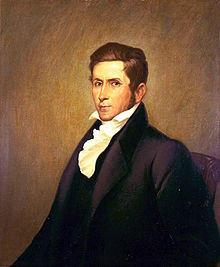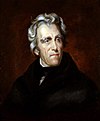Mahlon Dickerson
Mahlon Dickerson | |
|---|---|
 | |
| 10th United States Secretary of the Navy | |
| In office July 1, 1834 – June 30, 1838 | |
| Preceded by | Levi Woodbury |
| Succeeded by | James K. Paulding |
| 7th Governor of New Jersey | |
| In office October 26, 1815 – February 1, 1817 | |
| Preceded by | William Kennedy as Acting Governor |
| Succeeded by | Isaac Halstead Williamson |
| United States Senator from New Jersey (Class 2) | |
| In office March 4, 1817 – January 30, 1829 | |
| Preceded by | John Condit |
| Succeeded by | Theodore Frelinghuysen |
| United States Senator from New Jersey (Class 1) | |
| In office January 30, 1829 – March 4, 1833 | |
| Preceded by | Ephraim Bateman |
| Succeeded by | Samuel L. Southard |
| Pennsylvania Attorney General | |
| In office July 22, 1808 – January 9, 1809 | |
| Preceded by | Joseph B. McKean |
| Succeeded by | Walter Franklin |
| Personal details | |
| Born | April 17, 1770 Hanover Township, New Jersey |
| Died | October 5, 1853 (aged 83) Succasunna, New Jersey |
| Political party | Democratic-Republican, Democrat |
| Alma mater | College of New Jersey |
| Profession | Politician, Lawyer, Judge |
| Military service | |
| Branch/service | New Jersey Detached Militia |
| Rank | Private |
| Battles/wars | Whiskey Rebellion |
Mahlon Dickerson (April 17, 1770 – October 5, 1853) was an American judge and politician. He was elected Governor of New Jersey as well as United States Senator from that state. He was twice appointed Secretary of the Navy - under Presidents Andrew Jackson and Martin van Buren. He was the elder brother of New Jersey Governor Philemon Dickerson.
History
Born in Hanover Township, New Jersey, he was educated by private tutors and graduated with an A.B. from the College of New Jersey (now Princeton University) in 1789. He then studied the law to be admitted to the bar in 1793.
During the Whiskey Rebellion, he served as a private in the Second Regiment Cavalry, New Jersey Detached Militia.
Career
After his militia service, he settled in Philadelphia, and began practicing in Pennsylvania courts in 1797. He served as a Judge of the Mayor's Court, and as a member of the Philadelphia Common Council in 1799. He was named state commissioner of bankruptcy in 1802, served as adjutant general of Pennsylvania from 1805 to 1808, attorney general of Pennsylvania from 1808 to 1809, and as Philadelphia city recorder from 1808 to 1810.
He returned to New Jersey, settling in Morris County in 1810. Elected to the New Jersey General Assembly in 1811, he served one term. He was law reporter for the New Jersey Supreme Court from 1813 to 1814, and a justice of the same from 1813 to 1815. He was elected Governor of New Jersey in 1815 and served until 1817, having been elected as a Democratic-Republican to the United States Senate in 1816.
Dickerson served in the Senate from March 4, 1817 to January 30, 1829, when he resigned, but he was immediately reelected to fill the vacancy caused by the resignation of Ephraim Bateman and served from January 30, 1829, to March 4, 1833, for a total of 16 years of service. Dickerson served as chairman of the U.S. Senate Committee on the Library during the 15th Congress, chairman of the U.S. Senate Committee on Commerce and Manufactures for the 16th through 18th Congresses and the U.S. Senate Committee on Manufactures from the 19th through 22nd Congresses.
In 1833, upon leaving the Senate, he was elected Member of the New Jersey Legislative Council for Morris County and served as Vice President for that term. In 1834 he declined appointment as Minister to Russia. In June of that year, he was appointed Secretary of the Navy by President Andrew Jackson and was reappointed by President Martin Van Buren, serving until June 1838. The destroyer USS Dickerson was named in his honor.
On July 14, 1840, Dickerson was nominated by President Martin Van Buren to a seat on the United States District Court for the District of New Jersey vacated by William Rossell. Dickerson was confirmed by the United States Senate on July 21, 1840, and received his commission on July 23, 1840. However, Dickerson was appointed as a place holder so his brother Philemon wouldn't have to give up his seat in the closely divided House of Representatives until very near the end of the Congress and the Van Buren Administration, so he served less than one year, resigning on February 16, 1841. He was also a delegate to the New Jersey constitutional convention of 1844.
Societies
During the 1820s, Dickerson was a member of the prestigious society, Columbian Institute for the Promotion of Arts and Sciences, who counted among their members former presidents Andrew Jackson and John Quincy Adams and many prominent men of the day, including well-known representatives of the military, government service, medical and other professions.[1]
Later life
Dickerson died in 1853 in Succasunna, New Jersey and is interred at Presbyterian Cemetery, Succasunna.
Legacy
Mahlon Dickerson Reservation in Morris County is named after him.
References
- ^ Rathbun, Richard. The Columbian institute for the promotion of arts and sciences: A Washington Society of 1816-1838. Bulletin of the United States National Museum, October 18, 1917. Retrieved 2010-06-20.
Biography
- United States Congress. "Mahlon Dickerson (id: D000308)". Biographical Directory of the United States Congress.
- Mahlon Dickerson at the Biographical Directory of Federal Judges, a publication of the Federal Judicial Center.
External links
- Biography of Mahlon Dickerson, New Jersey State Library
- New Jersey Governor Mahlon Dickerson, National Governors Association
- Article at "Discovering Lewis & Clark"
- Biography of Mahlon Dickerson from The Political Graveyard
- Mahlon Dickerson at Find a Grave
- Mahlon Dickerson Reservation, a 3,200-acre Morris County, New Jersey public park
- 1770 births
- 1853 deaths
- Governors of New Jersey
- Philadelphia City Council members
- Members of the New Jersey Legislative Council
- Members of the New Jersey General Assembly
- People from Hanover Township, New Jersey
- Princeton University alumni
- United States Secretaries of the Navy
- United States Senators from New Jersey
- Judges of the United States District Court for the District of New Jersey
- United States federal judges appointed by Martin Van Buren
- American Episcopalians
- New Jersey Supreme Court justices
- New Jersey Democratic-Republicans
- New Jersey Democrats
- Democratic-Republican Party United States Senators
- Democratic Party United States Senators
- United States Army soldiers
- Van Buren administration cabinet members
- Jackson administration cabinet members
- Burials in New Jersey
- Democratic-Republican Party state governors of the United States
- People of the Whiskey Rebellion









